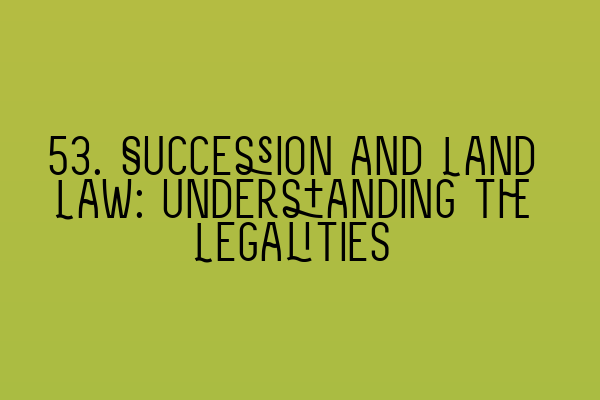53. Succession and Land Law: Understanding the Legalities
In the world of property law, the concept of succession holds immense importance. When it comes to land law, understanding the legalities surrounding succession is crucial. In this article, we will delve into the intricacies of succession and how it applies to land law.
What is Succession?
Succession refers to the transfer of property rights from one person to another upon the death of the property owner. It involves the process of inheritance and the distribution of assets according to the laws of succession. In land law, succession operates under specific rules and regulations.
Succession in Land Law
Succession in land law deals with the transfer of real property from a deceased person to their heirs or beneficiaries. The transfer can occur through either testate succession (where there is a valid will) or intestate succession (where there is no will). Let’s explore these two modes of succession in more detail.
Testate Succession
Testate succession occurs when a property owner leaves a valid will outlining their wishes for the distribution of their assets after their death. The will typically includes provisions regarding the transfer of real property, such as land or buildings, to specific individuals or organizations.
When a person dies and their will is legally validated, the property will be transferred to the designated beneficiaries according to the terms of the will. However, it’s essential to note that the transfer of real property through testate succession is subject to any applicable laws and regulations governing inheritance and taxation.
If a dispute arises regarding the validity of the will or the distribution of property, it may be necessary to involve the court to resolve the matter. Seeking legal advice from a property law solicitor is advisable in such situations.
Intestate Succession
Intestate succession occurs when a property owner dies without leaving a valid will. In such cases, the distribution of the property is governed by the laws of intestacy, which vary depending on the jurisdiction. These laws typically outline a predetermined order of inheritance, determining who is entitled to the property.
The laws of intestacy prioritize the deceased person’s closest relatives to inherit the property. The exact order of inheritance may differ, but it usually follows a pattern such as spouse, children, parents, siblings, and other relatives.
If no eligible relatives can be found, the property may escheat to the state, meaning it becomes state-owned.
The Role of a Property Law Solicitor
When dealing with succession and land law, consulting a property law solicitor is highly recommended. A solicitor specializing in succession and land law can guide you through the process, ensuring that all legal requirements are met, and the transfer of property is carried out smoothly.
A property law solicitor can assist with:
- Reviewing and advising on the validity of wills
- Interpreting and enforcing the terms of a will
- Handling disputes and litigation related to succession
- Ensuring compliance with inheritance and taxation laws
- Conducting property searches and due diligence
With their expertise in property law, a solicitor can provide peace of mind and ensure that your rights and interests are protected throughout the succession process.
Conclusion
Succession is an integral part of land law, governing the transfer of real property from one person to another upon death. Understanding the legalities surrounding succession is vital, whether it be testate or intestate succession.
Consulting a property law solicitor is crucial to ensure a smooth and legally compliant transfer of property. A solicitor can navigate the complexities of succession and provide expert guidance throughout the process.
Related Articles:
